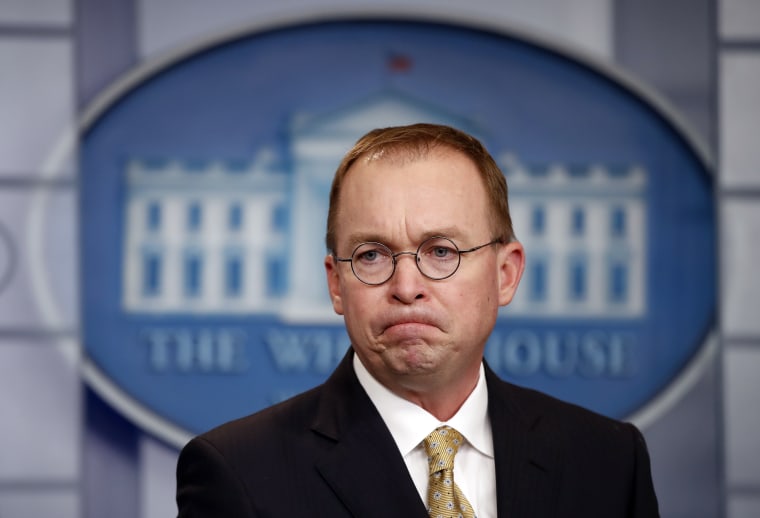In late October 2012, just days ahead of Barack Obama's re-election, Donald Trump published a tweet directed at the sitting Democratic president. "Why does Obama believe he shouldn't comply with record releases that his predecessors did of their own volition?" the Republican complained. "Hiding something?"
Four-and-a-half years later, I'm still a little fuzzy on what it was, exactly, Trump thought Obama was hiding, but when it comes to complying with record releases that his predecessors did of their own volition, the current president and his team have found themselves in a difficult spot.
President Trump's acting chief of staff said Sunday that Democrats' efforts to see Trump's tax returns will "never" be successful, and "nor should they.""That's an issue that was already litigated during the election," [Mick Mulvaney said on Fox News]. "Voters knew the president could have given his tax returns. They knew that he didn't, and they elected him anyway."
After all years of questions about Trump's insistence on secrecy, it's curious that top members of the president's team can't think of better arguments.
In this case, if the will of the voters is paramount, it's worth noting that Trump actually lost the popular vote -- it was the electoral college, not voters, who put the Republican in power. What's more, two years later, voters easily elected a House Democratic majority, after Dems ran on a platform emphasizing oversight.
Let's also not forget that the importance of Trump's returns has grown more acute in light of revelations that came to the fore after the 2016 election.
But of particular interest was Mulvaney's use of the word "never." Two years before Trump launched his candidacy, he vowed, "If I decide to run for office, I'll produce my tax returns, absolutely." In the years that followed, Trump routinely promised to disclose the materials once an IRS audit -- that may or may not have been real -- was complete.
But now those promises have been replaced with a categorical statement that the president's tax returns -- documents that every major-party nominee has voluntarily disclosed since Watergate -- will be kept secret permanently.
It was part of a larger message on the issue that made it seem as if Trump World is feeling a little desperate on the matter.
An attorney for President Trump on Friday told the Treasury Department it should not turn over the president's tax returns until it receives a legal opinion from the Justice Department, calling on Treasury to deny Democrats' demands for six years of the president's records.William S. Consovoy, the attorney, attacked the request from Rep. Richard E. Neal (D-Mass.), chairman of the House Ways and Means Committee, as a "gross abuse of power," arguing that it risks encroaching on taxpayers' privacy.
For nearly a century, federal law has extended authority to certain members of Congress, empowering them to access individual tax returns. The language of the law is not at all ambiguous, and last week, House Ways and Means Committee Chairman Richard Neal (D-Mass.) formally instructed the Treasury Department to produce the president's tax materials, exercising the chairman's authority under the law.
Trump isn't necessarily a party to the dispute -- it would appear to be a matter between Congress and Treasury -- but the president's lawyers nevertheless pressed the cabinet agency not to comply.
In theory, there shouldn't be any political interference from the president about how and whether officials follow the law, but again, Trump and his team are giving every indication that they're feeling desperate.
A separate Washington Post report added that the president "has said he would take the fight over his tax returns all the way to the U.S. Supreme Court."
To borrow a message, why does Trump believe he shouldn't comply with record releases that his predecessors did of their own volition? Hiding something?
